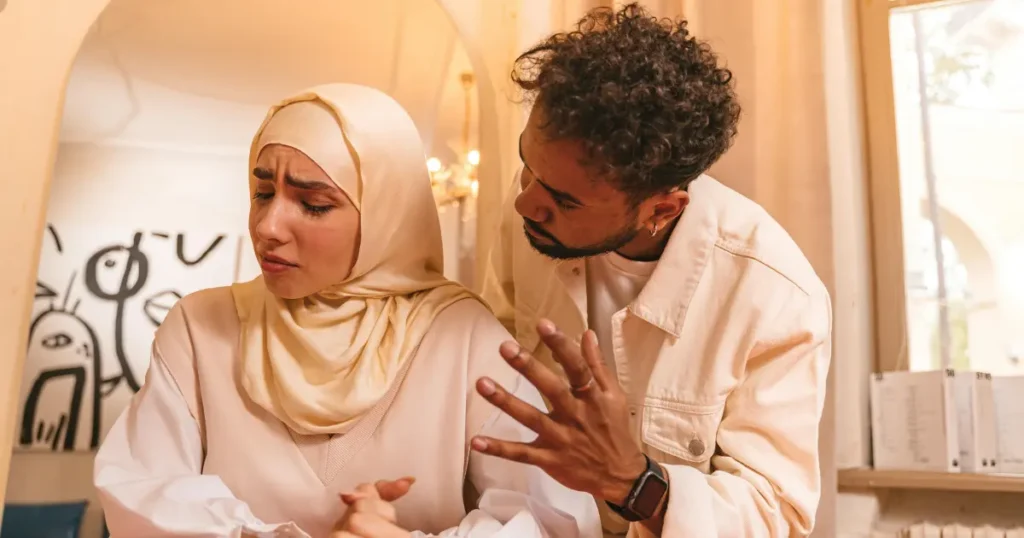
Introduction — Love Hurts, But Healing Is Possible
“Most couples apologize—but never truly heal. Here’s why.”
Ever found yourself saying “I’m sorry” just to end an argument while your partner still looked like they’d been hit in the gut? Yes, everyone has been there. The truth is most of us have no clue about the difference between apologizing and asking for forgiveness. And that gap in love? It’s huge.
A quick “I’m sorry” might help calm things down, but it doesn’t always resolve the problem. That’s because apologizing vs forgiveness is more than just words—it’s about emotional accountability, relationship healing, and, yes, even a little vulnerability.
Love Therapy isn’t about slapping a Band-Aid on broken trust. It’s about really understanding emotional repair. In this post, we’ll explore why saying sorry isn’t enough, how to identify a genuine apology, and what it takes to truly seek forgiveness in love—so your relationship not only survives but also grows.
What Is the Difference Between Apologizing and Asking for Forgiveness?

So, what’s the real difference between saying “I’m sorry” and asking someone to forgive you?
Let’s break it down.
An apology is when you acknowledge that you have made a mistake. It’s your way of saying, “Hey, I know I hurt you.” But there’s a catch: it’s still your chance. It’s about taking responsibility, but it doesn’t immediately resolve the problem.
You may want to read: Flowers for Apology to Girlfriend and Save Your Love
Asking for forgiveness, on the other hand, flips the script. Now you’re in their hands. You’re not just telling them you’re sorry; you’re also letting them decide whether the relationship continues or not. That’s vulnerability on a whole new level.
This is the difference between apologizing and asking for forgiveness: one focuses on your guilt, the other on your pain.
Apologizing versus forgiveness in love plays two distinct roles—apology initiates the healing process, but forgiveness fosters emotional connection, rebuilds trust, and promotes true relationship growth.
You may want to read: The Ultimate Romantic Ways To Say Sorry To Your Boyfriend
The Anatomy of a Heartfelt Apology
Not all “I’m sorry” s are created equal. Some feel like a warm hug. Who else? Like a cold text message at 2 a.m.
The difference? It comes down to an emotional apology vs. a transactional apology.
A transactional apology sounds like this: “I said sorry, what more do you want?” It’s rushed, defensive, and all about ending the awkward silence. There’s no depth, no emotional accountability, and definitely no effort to repair the damage.
You may want to read: Dating A Woman With Masculine Energy: The Brutal Truth
A heartfelt apology, though, hits differently. It’s real. It says, “I hurt you, and I’m sorry.” Here’s what I’m doing to make it right. That’s regret, accountability, and a commitment to real change.
For example:
❌ *”Sorry you felt that way.” (Not it.)
✅ “I realize I hurt you when I ignored your call. You didn’t deserve that, and I’m working on being more present.”
That’s relationship repair in action.
You may want to read: Boundaries In Dating Christian Couples That Keep Love Pure
The Vulnerability Behind Asking for Forgiveness

“Let’s be real—asking for forgiveness isn’t just tough. It’s very scary.”
“Why?” Because it means dropping your guard, owning the hurt you caused, and saying, You matter more than my pride. That’s a vulnerability in relationships, and it takes guts.
If you say sorry, it’s usually to get rid of your sorrow. But asking for forgiveness is about their healing. It’s about stepping into their pain and saying, “I see you. I’m not just sorry—I want to make it right.”
Indeed, it is tougher. It’s also a lot stronger. It fosters emotional safety, strengthens intimacy, and initiates genuine healing in relationships. That’s where love really happens again.
Need romantic ways to ask? Try this:
“I know I broke your trust, and you didn’t deserve that. I love you, and if you can find it in your heart, I’m asking for your forgiveness—not just your understanding.”
That’s not just sweet—it’s love therapy in motion.
You may want to read: What to Do When You Get Dumped—Heal Faster Now
Emotional Intelligence in the Apology Process
You can say “I’m sorry” a hundred times, but if it lacks empathy, it lands flat. Real healing in love? That starts with emotional intelligence.
When you tap into empathy, you’re not just saying sorry—you’re feeling their pain with them. That you care about how your deeds made them feel shows them that you value their feelings.
There is a substantial difference between emotional maturity and superficial apologies. “Sorry,” which isn’t very deep, means “Let’s move on.” But emotional maturity says, ‘Let’s talk about how you felt and what I can do to prevent you from going through that again.’
And here’s the truth—without self-awareness, you’ll keep making the same mistakes. Relationship growth happens when you look inward, take ownership, and grow from the pain you’ve caused.
In that case, saying sorry doesn’t just make things right; it also helps to heal the relationship. It rebuilds trust in love and leads to real emotional healing.
You may want to read: Letter To Ex Boyfriend That Might Reignite His Love
Why Forgiveness Feels Harder Than Apologizing

Let’s be honest—forgiveness can feel like swallowing broken glass.
While apologizing puts the ball in your court, forgiveness in love hands your heart right back to the person who hurt it. It’s real. It’s scary. And it takes emotional courage that most people aren’t ready for.
Here’s the kicker: saying “I’m sorry” is usually about regret—feeling bad about what happened. But remorse? That goes deeper. In that case, the person is ready to change, not just clean up the mess.
That’s why forgiveness is hard—it asks, “Can I trust this person not to break me again?” You’re not just getting over your anger. Love is once more at risk.
Forgiveness becomes an act of bravery when it’s done right. You don’t have to forget. You have to rebuild trust, claim your peace, and put your heart over the hurt.
And to be honest? That’s where real relationship repair begins.
You may want to read: Social Media Boundaries After Cheating: Save Your Love Life
Rebuilding Trust After Hurt
Trust isn’t something you fix overnight—it’s built bit by bit, day by day. When love takes a hit, consistent love becomes the glue that holds everything together.
Think of trust like a jar—every small act of honesty and care adds a little more until it’s full again. These are the micro-trust moments: returning calls on time, keeping promises, and being emotionally present. Even though they are small, they speak volumes.
To rebuild emotional connection and intimacy, couples need to create space for open talks and genuine listening. Check-in with each other often, or do things together that show you why you’re all in this together.
Fixing what’s broken isn’t enough to rebuild trust. It’s about growing stronger, hand in hand, through the ups and downs. That’s the real heart of relationship healing.
You may want to read: Why Self Love Is Not Selfish: 8 Ways to Prioritize Yourself Today
The Role of Love Languages in Apologies
Everyone feels sorry in their way. Understanding your partner’s love language is like discovering their emotional blueprint—it reveals how they truly feel loved and what brings them healing.
Different people need different kinds of reassurance when you say sorry. Some need acts of service or quality time to really feel it. When you tailor your apology to what really matters to them, it stops feeling like a routine “sorry” and becomes a heartfelt apology.
Most apologies, miss this emotional link. They pay attention to the words but not to how they sound. When you apologize using your partner’s love language, it conveys more than just words; it also shows genuine care and concern. It’s a bridge. It builds an emotional connection and makes forgiveness in love easier to find.
That’s how apologies turn from talk into real relationship repair.
You may want to read: Love Fading? 7 Ways to Improve Communication in Relationships
Relationship Healing Through Consistent Actions

Words are simple to say, but they don’t always stick. When it comes to relationship healing, actions speak louder than words.
It takes more than a quick “sorry” to show love after hurting someone. Being there when it matters, listening without judging, and keeping your promises are all daily actions that show what you stand for.
Earning forgiveness in love isn’t a one-time deal. It needs time, patience, and hard work. Showing up consistently, being vulnerable, and owning your mistakes helps rebuild that fragile trust.
Real relationship repair occurs when your partner sees your love in your actions, not just your words. That’s how you turn regret into lasting healing.
Forgiveness Without Reconciliation: When Love Isn’t Enough
Sometimes, forgiving doesn’t mean going back to the way things were. You can accept an apology but still set clear boundaries to protect your heart.
Not every hurt deserves a second chance—especially if it risks dragging you into the same toxic cycle. It’s possible to find peace by forgiving someone rather than trying to fix the relationship with them.
This kind of forgiveness brings emotional closure and real strength. It’s about letting go without losing yourself.
When you’re in love, it can be brave to let go and move on. That’s real healing, even if it means developing feelings for someone you’re not physically with.
How to Create a Culture of Forgiveness in Your Relationship
Creating a relationship where forgiveness flows starts with small, daily habits. It means making your place safe enough so that both of you can be honest without worrying about getting hurt.
Owning your mistakes—no excuses, no blame—shows real accountability. When you’re honest about your mistakes, it makes your partner more likely to be open about theirs.
Point the finger of blame at growth instead. Instead of pointing fingers, work together to learn and heal. Becoming a healing partner means choosing connection over conflict every time.
This kind of mindset fosters lasting emotional safety and deepens your emotional connection—the foundation of genuine love and forgiveness.
Exercises for Love and Emotional Closure

Are you attempting to mend your relationship? Begin with simple tools that help bring your feelings to light.
Couples journaling prompts help you explore emotions honestly and gently. You can learn more about what’s really going on beneath the surface by writing things down.
If words get tricky, try apology and forgiveness letter templates. They show you how to say sorry or ask for forgiveness in a way that doesn’t seem forced.
For those tough talks, use “forgiveness conversations” inspired by emotional intelligence. These guided chats are all about understanding, listening, and finding things you have in common.
Together, these exercises build trust and help you reach that all-important emotional closure—the kind that brings real peace and paves the way for relationship healing.
Love Therapy Takeaway: Choose Healing Over Hurt
It’s important to remember that apologizing does not necessarily imply seeking forgiveness. When you say “I’m sorry,” you mean it. When you really mean it, you want to make things right.
Emotional responsibility means owning mistakes, being vulnerable, and working toward real repair. This is what makes love grow.
So, ask yourself: What kind of partner do you want to be? One who just says sorry? Or one who helps heal, rebuild trust, and keep love alive?
Choosing healing over hurt isn’t always easy, but it’s always worth it.
Final Thoughts — Apologies Open the Door, Forgiveness Walks Through It
Understanding the difference between apologizing and asking for forgiveness is key to real healing in love. Saying sorry might open the door, but it’s forgiveness that lets both of you step inside and start fresh.
It’s about choosing growth, not just feeling guilty or trying to fix things with empty words. For love to work, both people involved must walk the road from hurt to healing together.
When you lean into emotional accountability and vulnerability, you create space for trust to grow back stronger. Remember, true forgiveness in love isn’t a quick fix—it’s a powerful, shared process that rebuilds hearts and minds.
FAQs About Apologizing and Forgiveness in Relationships
Can you truly forgive someone but still feel hurt?
Yes, absolutely. Forgiveness can’t alleviate suffering overnight. Even after you’ve resolved to let go and move on, it takes time for emotions to heal.
Why do some people never ask for forgiveness even when they apologize?
Often, people avoid asking for forgiveness due to fear of exposure, pride obstructing their path, or a failure to recognize the depth of the hurt. Without that step, real healing is difficult to begin.
Is it possible to rebuild love after repeated apologies without change?
Not really. Words will not suffice to resolve the situation. Healing requires ongoing emotional commitment and a genuine attempt to change behavior; otherwise, trust will not be fully restored.